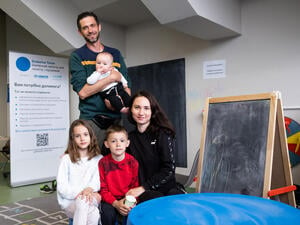Burns victims rushed for treatment in Lampedusa after high seas ordeal
Burns victims rushed for treatment in Lampedusa after high seas ordeal

Italian rescue workers rush an injured person, hands swathed in bloodied bandages, off a rescue vessel in Lampedusa.
LAMPEDUSA ISLAND, Italy, April 17 (UNHCR) - A baby as young as six months, with severe burns across half of her face, was among traumatized survivors of the latest sea rescue off the coast of southern Italy's Lampedusa Island.
The infant was one of 70 refugees and migrants on board a half-inflated rubber dinghy that had set sail from Libya and been rescued by the Italian coastguard after two days on the Mediterranean Sea. Many people had been badly burned before even setting foot on the vessel, after a gas canister exploded while they were being held by smugglers on land.
Among the island's newest arrivals on Thursday night were 20 women, 47 men and two children. One 25-year-old woman did not survive the hazardous journey, and lay in a black body bag before being placed in a coffin.
Those who could walk were escorted from the rescue ship, wearing bloodied, makeshift bandages over their hands, faces or feet. Emergency blankets had been draped around their shoulders, as they made their way onto coaches waiting to transport them to a reception centre for processing.
"They told us that traffickers held them before placing them on boats, and a gas cylinder exploded, killing several people and injuring many others. The traffickers would not allow them to leave and reach the hospital, so they didn't get treatment for few days and then they were put on a rubber dinghy," said Barbara Molinario, a UNHCR spokesperson:
She added that when rescuers arrived the people had spent two days at sea, but they were drifting away because their dinghy was leaking air. "We have seen severe burns before but they are usually due to the conditions on the boats," Molinario said. "Usually it's because of the fact that they are sitting in fuel and salty water for few days, so they come and they are burnt. But nothing as bad as this, because the burns were more severe, because more people were injured and because they also involved very small children."
Ambulances, their lights blazing into the dark night, took those who had been stretchered off the rescue ship to a local infirmary. There, they were examined by a doctor, with 23 being helicoptered off the island for treatment.
Inside the reception area of the Sanitorio di Lampedusa, several women with severe burns to their faces and body sat staring vacantly, as pained groans came from an adjoining room. Many lay on the stretchers they had been brought in on. "Doctor, no!" cried one woman, as he treated her wounds.
The vessel that had carried her over the Mediterranean was one of several that have carried around 13,500 people into Italian waters over the past week, as sailing conditions improve. Their arrival exacerbates a growing crisis which has seen some 31,500 people cross Mediterranean waters to Italy and Greece so far this year, as war and violence intensify in sub-Saharan Africa and the Middle East.
In light of these numbers and a tragic capsizing off Libya earlier this week of a double-deck boat, in which around 400 are feared to have died, UNHCR is appealing afresh to governments across Europe to prioritize the saving of lives, by urgently expanding and upgrading search-and-rescue capacities.
Even as Italy's Guardia di Finanza and others helped people off the coastguard ship here last night, another helicopter was roaming the night skies above, its searchlight combing the black, choppy waters of the Mediterranean.
By early morning, all traces of the rescue ship and the refugees on board had disappeared from Lampedusa Bay. For now, their terror is over, but further struggle lies ahead, as they seek to rebuild new lives in Europe.
By Kate Bond on Lampedusa Island, Italy








